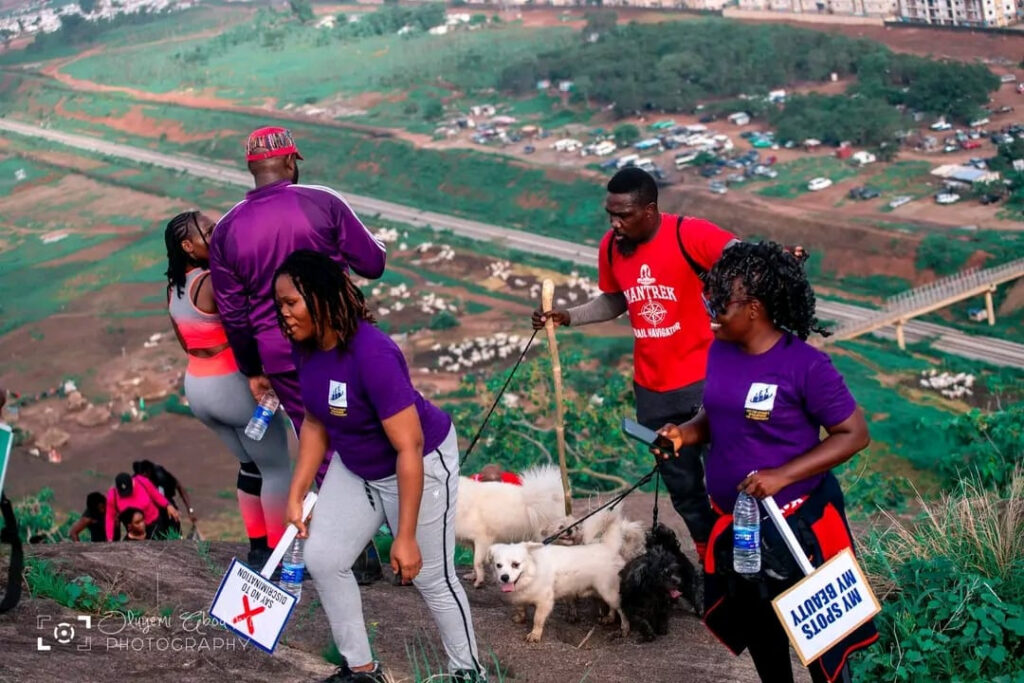These Nigerian Women Are Fighting the Stigma Around Vitiligo as ‘Witchcraft’—For a Friend

What do you do when your friend is suffering? You drop everything and help. That’s exactly what Faith Joshua-Uba and Gloria Ezinwa did when they saw the discrimination and mental turmoil their friend with vitiligo was experiencing as a result of the stigma associated with the condition in Nigeria.
Their friend Bisi (not her real name) was in university when she first noticed white spots on her skin. At first, she mistook the patches for eczema or an allergic reaction. A dermatologist later explained that it was vitiligo. Following her diagnosis, as the vitiligo continued to spread to visible areas of her skin, she began to experience public discrimination and sometimes deep hate. She was called “cow” and “zebra” and had a hard time associating with people due to the patches on her skin. The social alienation caused her to become depressed and pull away from even the people closest to her.
Unfortunately, Bisi’s story isn’t unique. Living with vitiligo in Nigeria can be challenging due to cultural perceptions and stigmas surrounding the condition. Many people in the country associate vitiligo with negative beliefs such as witchcraft, bad luck, and curses, leading to severe discrimination, depression, and social isolation for those living with it.
“In Nigeria and other parts of Africa, people with vitiligo have a harder time being in relationships and engaging in business as their disease is seen as contagious and it is believed that their money is unclean because of their vitiligo,” said Faith about the cultural stigmas associated with vitiligo. “In some instances, the person with vitiligo is not even aware of the condition and sees it as a curse from God, or a spiritual attack. They may even go to prayer houses to clean their spirits instead of seeing a dermatologist.”
For Faith, Gloria, and their team, stepping up for their friend was an easy decision. The two ladies are leading the Vitiligo Awareness and Support Project of The Lift for Citizen’s Development and Advancement Ltd/Gte (LICDA), an organization created in 2020 with a mission of advancing internet integrity as well as promoting climate justice and public health, and entrenching a society with good governance, accountability and respect for human rights in Nigeria and beyond. The Vitiligo Awareness and Support Project seeks to increase vitiligo awareness in Nigeria and provide support for those living with the condition.

Through this project, LICDA has hosted two virtual webinars to provide vitiligo education. Most recently, the organization also hosted a Vitiligo Awareness Hike in June 2024. The hike brought together 68 attendees including individuals affected by vitiligo, their families, friends, healthcare professionals, and advocates. Covering a 5-mile trail with stunning views, the walk symbolized the journey of overcoming challenges.
Moving forward, LICDA hopes to continue vitiligo awareness through communication campaigns and a support group where those living with the condition can be connected with the resources and experts they need.
“We want to help people love themselves, irrespective of their spots,” said Faith about their mission and work for vitiligo. “Some people with vitiligo do not love themselves. It could be because of their own thoughts or influence from others including the local community and family and friends. So we need to bring awareness not only to those with vitiligo, but the community at large.”
The message Faith and Gloria are bringing to Nigeria runs counter-culture to the mainstream narrative around vitiligo. And that’s exactly why it matters.
“I see vitiligo as God playing with colors on people’s skin,” said Gloria, sharing her perspective on the condition. “This is beautiful. This is God doing extra work on this person. I want other people to see this too.”
You can learn more about the Vitiligo Awareness and Support Project by LICDA by visiting https://licdaafrica.org/.
A patient advocate, editor, and sought-after leader within the vitiligo community, Erika Page is also the Founder and CEO of Living Dappled. After getting vitiligo at the age of seven, she lost 100% of her skin’s pigment over 25 years. She fought her own mental and emotional battle to overcome her insecurities and embrace the skin she was in and today seeks to help other women reclaim their lives with this condition.


